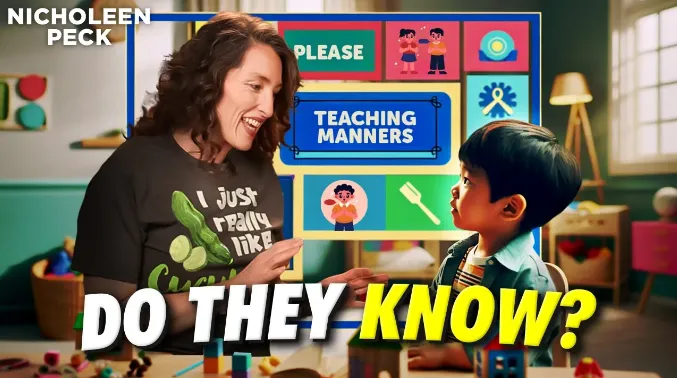
10 Mighty Manners That Kids Need To Learn
10 Mighty Manners Every Child Needs to Learn
Hi, I'm Nicholeen Peck, and I travel the world teaching about parenting, effective communication, building strong family bonds, child development, and education—all through the lens of the principle of self-government. In this article, we’ll explore ten crucial manners that children should learn and discuss why manners still matter in today's world, where they often seem undervalued.
Why Manners Matter
Manners are a fundamental way to show respect and regard for others. When people disregard manners, they often come across as selfish. We want our children to be taken seriously in education, business, and social situations. Teaching them manners helps them achieve this. Manners are also a part of self-mastery or self-government. Practicing good manners is evidence of a self-governed person. Good manners reflect good character. Integrity, honesty about the value of others, and treating them accordingly are all signs of good character. Despite society sometimes celebrating rude and selfish behavior, genuine happiness and strong relationships come from practicing good manners.
Teaching Manners
Don’t take a lack of manners personally. Some people haven’t received proper manners training, and young children often need guidance. Train children to recognize when manners are appropriate and how to use them. Everything on the Teaching Self-Government channel is about deliberate action and self-control. The ten mighty manners we'll discuss next are all related to self-government.
The Ten Mighty Manners
1. Look People in the Eye: When talking to someone, maintain eye contact. This shows confidence, respect, and a willingness to understand another person’s perspective. Good eye contact is the first step of the four basic skills of self-government.
2. Don’t Talk Back, Discuss Instead: Interrupting or talking back is rude. Teach children to discuss issues calmly and appropriately. The skill of disagreeing appropriately involves waiting until the other person has finished talking, which requires patience and good character.
3. Ask Permission to Inconvenience Others: Saying “Excuse me” before interrupting shows consideration and respect. Acknowledge that others might be busy or focused on something else. This shows that you don’t consider yourself the most important person in the room.
4. Apologize: Humility is a sign of great character. Apologizing, even for accidents, shows honesty and a willingness to accept consequences. Apologies open the door to better communication and connection.
5. Keep a Calm Face: Our facial expressions often reveal frustration, annoyance, or boredom. Keeping a calm face shows that you care about what others have to say and are focused on them.
6. Forgive: Forgiving those who bother, hurt, or inconvenience you is good manners. It’s beneficial not to hold on to bad feelings and shows charity and good character. Teach children how to accept apologies graciously.
7. Answer Questions with More Details: Short answers can be perceived as rude. Engage in conversations by providing more information. This shows social awareness and good manners.
8. Help Others Without Being Asked: Be proactive in offering help. This makes others feel valued and strengthens relationships. Think about what you can do for others rather than just focusing on yourself.
9. Show Good Sportsmanship: Don’t be overly competitive about games, sports, or fairness. Accepting a loss gracefully is part of good character and self-government. Nobody enjoys playing with someone who always needs to win.
10. Stay Calm: Remaining calm in various situations is the most important manner. It creates a safe and comfortable environment where people want to be around you. Calmness is crucial in managing emotions and interactions.
I hope this article helps you teach these mighty manners to your children. To assist further with calmness, I offer a free Calm Parenting Toolkit. This mini-course contains ten lessons on calmness. Visit teachselfgov.com/toolkit to access it for free. See you there!

